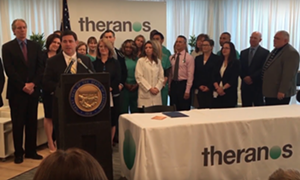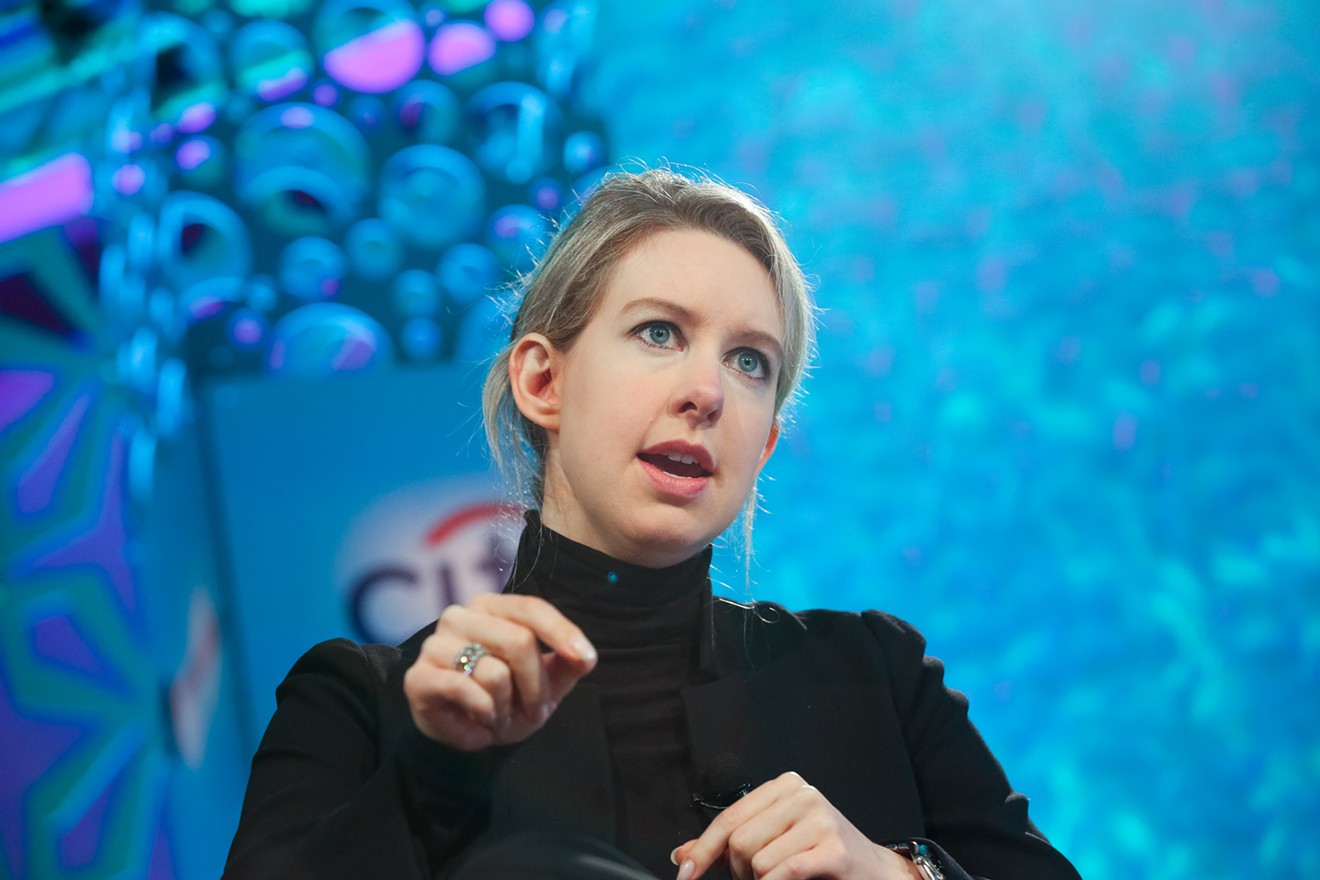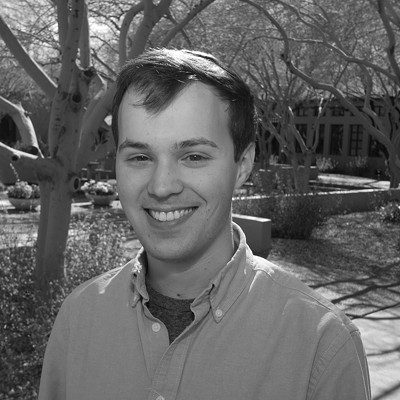It was April 6, 2015, and Arizona Governor Doug Ducey was standing at a podium at the Scottsdale laboratory of blood-testing startup Theranos.
"Some people are born to be leaders," he said. "Some people are born to be business leaders. Elizabeth Holmes is both of those."
The company’s wunderkind founder was also in the room. Her team had seemingly achieved the impossible: a method to quickly and accurately run laboratory-style tests on just a few drops of blood pricked from a finger.
The governor was at the laboratory to sign HB 2645, a bill devised by Theranos that would allow anyone to order a laboratory test without the approval of a doctor. The company had been operating around 40 “wellness centers” in the Phoenix area since 2013, most of them in Walgreens stores.
At the bill signing, Ducey reiterated his trademark pledge of “lessening the burdensome regulations that hinder success.” He applauded Holmes as “a game-changer in the medical field.”
“Her devotion to serving and empowering patients with new and improved technology is just incredible,” Ducey said.

Arizona Governor Doug Ducey at a 2015 press conference held at Theranos's Scottsdale facility.
Governor Doug Ducey/YouTube
Theranos had not developed a revolutionary new way to test for medical conditions without using a syringe to draw blood. On the contrary, the company had launched a haphazard testing procedure that had the potential to badly skew blood test results. When they walked into one of Theranos’ clinics in Arizona, patients were risking a misdiagnosis or being prescribed the wrong dosage of medication.
And despite the company's claims, Theranos was only using its proprietary machine — called the Edison — for a fraction of the blood tests, relying on traditional machines from competitors like Siemans for the rest.
A new book by Wall Street Journal reporter John Carreyrou, Bad Blood: Secrets and Lies in a Silicon Valley Startup, describes how Theranos executed a sweeping con during its hubristic drive to change the world and reel in venture capital dollars. Carreyrou, who will speak at Changing Hands bookstore in Tempe on Monday, broke the story of Theranos’ faulty blood testing scheme in a series of articles beginning in October 2015.
“It was narcissism, it was hubris, and it was greed,” he told Phoenix New Times on Thursday.
“Part of them had to know that they were committing wrongdoing; they were crossing red lines; that the gap between their promises and the reality of the development of this technology was so enormous as to be fraudulent,” Carreyrou said. “But they also were convinced that what they were doing in the long run was going to be game-changing.”
To report the fraudulent practices, Carreyrou and his sources withstood threats and intimidation tactics from Theranos and its high-octane legal team, which included David Boies of the Bush v. Gore case before the Supreme Court.
Holmes had been systematically misleading investors and media outlets about her company’s capabilities from the start, Carreyrou showed. Meanwhile, the company was a mess. Holmes, along with her boyfriend/second-in-command Ramesh “Sunny” Balwani, dodged regulations to push into Arizona despite knowing Theranos’ portable blood-testing machines didn’t work as advertised.
In the process, Ducey "essentially became a public supporter of Theranos,” Carreyrou said.
“The Legislature in Arizona passed uncritically the direct testing bill that Theranos all but wrote itself and heavily lobbied for,” Carreyrou said. “While people like Ducey and representatives in the local Legislature certainly didn’t know that they were dealing with a fraud and with a startup founder who was lying and deceiving them, they certainly made it easier for her and ... Balwani, by accepting all her claims uncritically."
To date, the governor has not spoken publicly on Theranos ever since the company entered a legal death spiral.
"It's up to any new business model to prove themselves in the market and if a company breaks the rules, there should be consequences," Ducey spokesperson Elizabeth Berry said in a statement. "Public health and safety is always a top concern and the law we signed wasn't about one company, it was a reform that was about expanding patient access."
Ducey and Arizona legislators weren’t the only powerful people who got swindled. Silicon Valley venture capitalists also threw money at Theranos, drawn in by Holmes’ personal magnetism and the sky-high promises of what her company’s machines could accomplish.
When the company was revealed to be a sham, Theranos’s investors, as well as Walgreens, turned on her and sued the company. Finally, in March, the U.S. Securities and Exchange Commission filed a lawsuit against Theranos, Holmes, and Balwani that alleged fraud on a massive scale. Holmes reached a settlement with the SEC: She agreed to give up her shares of the company and is prohibited from serving as an officer of a publicly traded company for 10 years.
In a separate settlement with Arizona Attorney General Mark Brnovich in April 2017, Theranos agreed to pay $4.65 million back to consumers who purchased the company’s unreliable blood tests.
According to Carreyrou, Theranos chose Arizona as the laboratory for its faulty and unreliable blood-testing technology because of the state’s perceived pro-business environment and the large number of uninsured residents eager to get their blood tested.
“They felt like those uninsured patients in the Phoenix area would be especially sensitive to the low prices that they offered,” he said.
Phoenix wasn’t the first city where Theranos began offering its finger-stick blood tests to the public — it previously launched in Palo Alto — but the Phoenix metro area soon became its main staging ground for the company’s retail collaboration with Walgreens.
“I would say that authorities in Arizona got in bed, in a sense, with Theranos,” Carreyrou said.
To report the story, Carreyrou traveled to Phoenix in April 2015, spurred by tips and interviews with ex-Theranos employees who said something was deeply wrong at the company.
“The way Theranos is operating is like trying to build a bus while you’re driving the bus,” one anonymous former high-ranking lab employee told Carreyrou, a conversation he recounts in the book. “Someone is going to get killed.”
In Arizona, Carreyrou interviewed doctors and patients, and even had his own blood drawn at a Theranos clinic inside Walgreens. His sources described receiving shocking test results from Theranos, only to have their blood re-tested in a conventional lab or clinic, where they received reasonable results.
People believed in the game-changing promises that Holmes was selling, Carreyrou said. The credulous backers ranged from her highly decorated company board members — including former Secretary of State George Shultz and then-retired general James “Mad Dog” Mattis. They also included investors and the Arizona politicians led by Ducey who cheered her on at Theranos’s Scottsdale facility.
“I don’t think anyone stopped to think or ask whether these scientific claims that she was making were believable and credible,” Carreyrou said.
This article has been updated with a comment from the governor's office.













